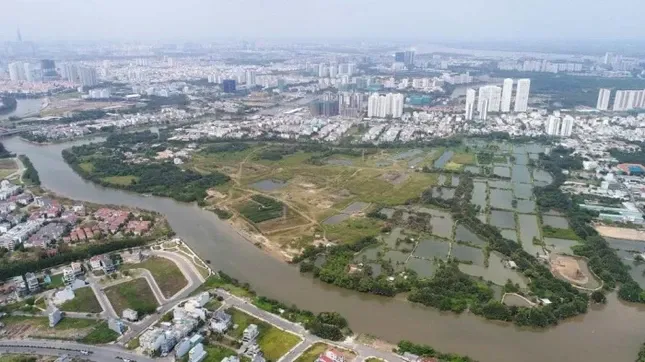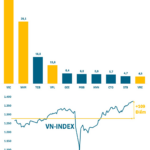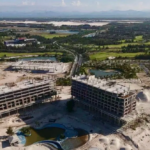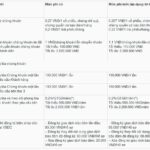The Fault Doesn’t Lie with Businesses
Mr. Dang Hong Anh, Chairman of the Vietnam Young Entrepreneurs Association, shared concerns about certain provisions in the Government’s draft decree amending and supplementing several articles of Decree No. 103/2024/ND-CP on land use fees and land rental.
Specifically, the draft continues to impose a supplementary tax of 5.4% per year on land use payments not made during the period before land costs are calculated. This not only creates an absurd situation but also poses legal and economic risks for businesses.
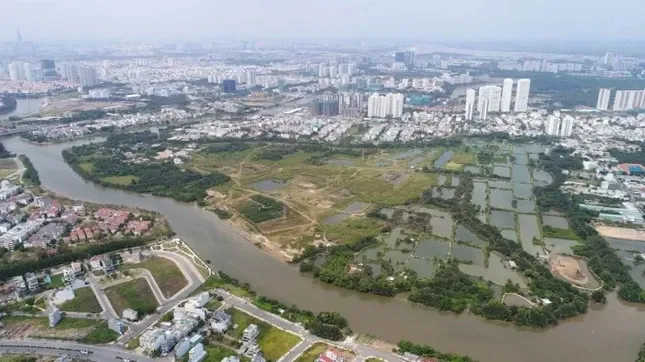
The draft decree continues to impose a supplementary tax of 5.4% per year on land use payments, creating potential legal risks.
According to Mr. Dang Hong Anh, the 5.4% supplementary collection is essentially an interest charge or late payment penalty applied to the period before businesses can fulfill their financial obligations regarding land. However, the reason for the delay is not due to businesses dragging their feet but rather the authorities’ pending land valuation and cost calculation.
“Aside from tax pressures, businesses also face challenges as projects that haven’t completed their financial obligations will not be eligible for subsequent legal procedures, from mortgage loans to product launches,” said Mr. Dang Hong Anh.
As a result, businesses incur significant losses and face the risk of cash flow deadlock. Projects cannot proceed, capital cannot be raised, opportunity costs are lost, and financial expenses continue to mount. All these factors create a dual burden that could push businesses towards bankruptcy or force them to halt their projects.
“If enacted, this regulation will deter investors from undertaking projects requiring large land areas and lengthy land cost calculation processes,” Mr. Dang Hong Anh observed.
Regarding cases where businesses are affected by delays in land valuation and cost calculation by authorities, Mr. Hong Anh suggested that the supplementary collection should be entirely waived, and administrative responsibility should be clearly assigned to the land price determination agency.
Increasing Input Costs
Similarly, Mr. Le Hoang Chau, Chairman of the Ho Chi Minh City Real Estate Association, asserted the need to amend Decree 103/2024/ND-CP to eliminate “contradictory” clauses, aligning with the Government’s commitment to address obstacles faced by real estate businesses.
“Despite bearing no fault, businesses are subject to late payment penalties. This increases input costs and hinders the recovery of the real estate market. If not promptly addressed, housing supply will remain bottlenecked, negatively impacting the economy. Penalties should only be imposed when the tax authority has notified the business of its financial obligations, and the business has failed to comply by the deadline. It is unreasonable to blame businesses when the cause lies in the sluggishness of the authorities,” stated Mr. Chau.
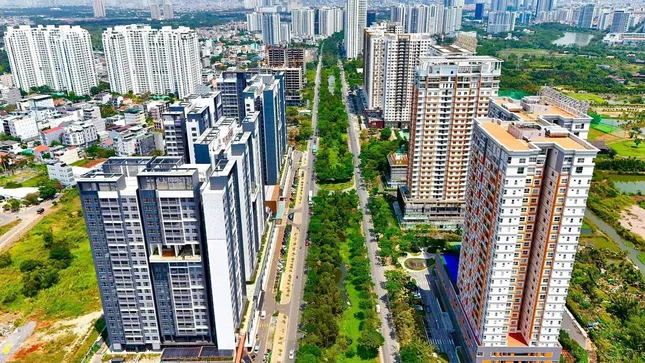
It is unreasonable to impose late payment penalties on businesses when they are not at fault.
Mr. Chau emphasized that urgently amending Decree 103 aligns with General Secretary To Lam’s directive to review and address bottlenecks caused by legal regulations. He quoted the General Secretary, stating, “It is imperative to focus on identifying and resolving bottlenecks arising from legal regulations, especially those that are contradictory, overlapping, unreasonable, or impractical, as well as those that are ambiguous and open to multiple interpretations within the legal system. This is a pressing task that demands immediate and vigorous action.”
The Chairman of the Ho Chi Minh City Real Estate Association further noted that land price determination and land use fee payment are prerequisite procedures for businesses to obtain commercial land use rights. Therefore, in line with the Prime Minister’s instructions, HoREA proposed that the Ministry of Finance need not wait for the amendment of Article 257 of the 2024 Land Law to revise Articles 50 and 51 of Decree 103. Instead, the government agency should recalculate the period used as the basis for supplementary land payments.
Mr. Chau suggested that the Ministry of Finance should only stipulate supplementary land use fee payments from August 1, 2024 (when the 2024 Land Law takes effect) until the date of the decision approving the land price, excluding the 180-day period for land price determination as per Clause 4, Article 155 of the 2024 Land Law. For cases before this period, the regulation should be amended to waive the supplementary payment for the period before land price determination.”
“Amending the regulation in this way will not only be appropriate for the current context but also resolve businesses’ difficulties, demonstrating the government agency’s thoroughness in reviewing and amending inconsistent provisions,” affirmed Mr. Chau.
An Intriguing Coincidence: VN-Index Surges 109 Points Since the Start of the Year, Mirroring Vingroup’s Contribution
“The Vietnamese stock market witnessed a remarkable surge with the VN-Index reaching a 3-year peak, largely driven by the impressive performance of the Vingroup conglomerate’s stocks, which have been on a strong upward trajectory since the beginning of the year.”
“Brokerage Fees Rise as VAT Takes Effect”
The recent introduction of a new value-added tax law has led to a stir in the stockbrokerage community. With a 10% tax rate now applicable to certain previously exempt securities operations, brokerages are having to adjust their service fee structures accordingly. This has sparked a wave of announcements from brokerages, notifying their clients of the impending changes.

